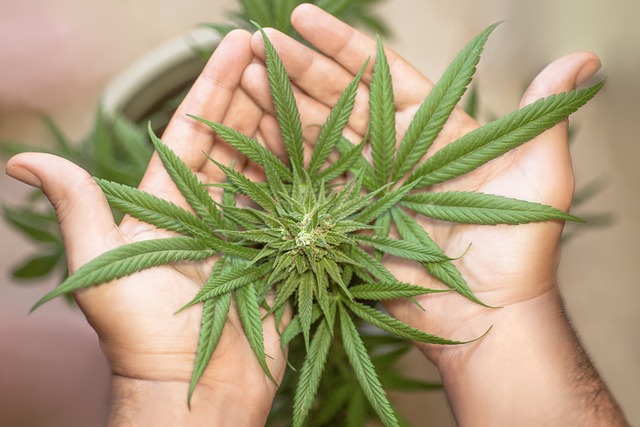THCA (tetrahydrocannabinolic acid), a non-psychoactive cannabinoid found in Cannabis sativa and the precursor to delta-9 THC, is legally available in Delaware under specific conditions that align with federal guidelines from the 2018 Farm Bill. In Delaware, THCA products like flowers must contain less than 0.3% delta-9 THC by weight. This legal status allows for the exploration of THCA's therapeutic properties, which potentially include anti-inflammatory, neuroprotective, and analgesic effects. The entourage effect from its rich cannabinoid, terpene, and flavonoid profile is believed to enhance these benefits. Consumers can consume THCA through various methods, including smoking and vaporizing, with the latter being a more controlled approach to absorbance. It's crucial for consumers in Delaware to procure from reputable suppliers to ensure the safety and efficacy of their products as the industry evolves with both scientific discovery and regulatory oversight. As per early 2023 regulations, THCA flower is legal in Delaware for medical use under the state's Medical Marijuana Program for qualified patients with a valid medical marijuana card. Users should adhere to legal stipulations and monitor legislative changes to stay informed on the evolving legal status of THCA products. THCA is recognized as having unique potential without psychoactive effects, which, combined with its growing legality in states like Delaware, positions it as a key player in personalized cannabinoid-based treatment options.
Exploring the multifaceted nature of the THCA flower, this article sheds light on its composition, effects, and the nuanced interplay with the body’s endocannabinoid system. Delving into the legal landscape, we examine the status of THCA flower in Delaware, clarifying its legality within state lines. A critical examination of potential side effects accompanies an analysis of medicinal properties and therapeutic uses, offering insight into both the benefits and risks associated with its consumption. Safety considerations, including dosage and proper storage, are paramount for users to mitigate any adverse reactions. With a focus on empirical evidence from studies and personal consumer experiences, this article aims to provide a comprehensive overview of THCA flower side effects in a regulated context, ensuring informed decision-making for consumers navigating the evolving world of cannabinoids.
- THCA Flower: An Overview of Its Composition and Effects
- The Legal Status of THCA Flower in Delaware
- Potential Side Effects of THCA Flower Consumption
- Understanding the Differences Between THCA and Other Cannabinoids
THCA Flower: An Overview of Its Composition and Effects

Delta-9 tetrahydrocannabinolic acid (THCA) is a non-psychoactive cannabinoid found in the Cannabis sativa plant and is considered the precursor to the more well-known psychoactive compound, delta-9 THC. The legal status of THCA flower varies by jurisdiction, with states like Delaware having specific laws regarding hemp-derived products containing THCA. In Delaware, THCA flower is legal provided it contains less than 0.3% delta-9 THC on a dry weight basis, aligning with the 2018 Farm Bill federal guidelines. This legality has opened avenues for research and exploration into the potential therapeutic properties of THCA, which include anti-inflammatory, neuroprotective, and analgesic effects without the psychoactive ‘high’ associated with delta-9 THC. The composition of THCA flower is rich in other cannabinoids, terpenes, and flavonoids, all of which contribute to its entourage effect, influencing the plant’s overall impact on well-being when consumed. Users in Delaware who are interested in the potential health benefits of THCA may choose to consume it through various methods, including smoking or vaporizing the flower, with each method affecting the rate at which the body absorbs the cannabinoid. It is crucial for consumers to source THCA flower from reputable suppliers to ensure quality and safety, as the cannabis industry continues to evolve with both scientific and regulatory advancements.
The Legal Status of THCA Flower in Delaware

In Delaware, the legal status of THCA flower, a non-psychoactive compound found in cannabis plants, is subject to state regulations that differ from federal guidelines. As of the knowledge cutoff in early 2023, Delaware has established its own framework for the use and possession of cannabis-related products, including THCA flower, under the Delaware Medical Marijuana Program. Patients with a valid medical marijuana card can legally access THCA flower and other cannabis products for therapeutic purposes. The Delaware State Legislature has passed laws allowing qualified patients to possess up to one ounce of cannabis, which includes THCA flower, for medical use. It’s important for consumers to adhere strictly to these regulations, as possession outside the scope of the program can lead to legal consequences. The state’s legislative efforts reflect a growing recognition of the potential therapeutic benefits of cannabinoids like THCA, and these laws are designed to ensure safe and legal access to these products within the medical community in Delaware. For those interested in the legal use of THCA flower, it is crucial to stay updated with the state’s regulations, as laws can evolve over time.
Potential Side Effects of THCA Flower Consumption

1. THCA, or tetrahydrocannabinolic acid, is a non-psychoactive cannabinoid found in hemp and cannabis plants that is believed to possess various therapeutic properties. As interest in cannabinoids has grown, so has the availability of products containing THCA, such as THCA flowers, which are legal in states like Delaware where hemp-derived products conforming to the 2018 Farm Bill guidelines are permitted. While THCA is not psychoactive, it is the precursor to THC, the primary psychoactive component of cannabis. Consumption of THCA flowers may lead to potential side effects, particularly when used in high concentrations or in conjunction with other cannabinoids. Reported side effects can include dry mouth and eyes, decreased blood pressure, and temporary derealization or depersonalization. It is important for consumers to start with low doses to gauge their individual reaction and to consult with a healthcare provider if they have concerns about how THCA might interact with other medications they are taking.
2. The side effects associated with THCA flower consumption can vary based on individual factors such as metabolism, tolerance, and personal sensitivity. In some cases, users may experience gastrointestinal issues like nausea or diarrhea, particularly if they have a low tolerance for cannabinoids. Additionally, while THCA is generally considered safe, it can still interact with certain medications, impacting their efficacy or causing adverse reactions. The legal status of THCA products means that consumers in Delaware have access to these items, but it also underscores the need for responsible use and proper dosing. As with any substance, individual experiences can differ greatly, and those new to THCA flowers should approach them with caution and seek out reputable sources for high-quality, lab-tested products to ensure safety and efficacy.
Understanding the Differences Between THCA and Other Cannabinoids

THCA, or Tetrahydrocannabinolic Acid, is one of the many cannabinoids found in the Cannabis sativa plant. Unlike its more famous derivative THC, THCA is non-psychoactive and has been gaining attention for its potential therapeutic properties. As of the knowledge cutoff in 2023, THCA’s legal status varies by jurisdiction; for instance, it is legal in Delaware under certain conditions. Understanding the nuances between THCA and other cannabinoids like CBD (Cannabidiol) and CBN (Cannabinol) is crucial for researchers and consumers alike, as each compound interacts with the body’s endocannabinoid system differently. THCA is known for its potential anti-inflammatory and neuroprotective effects, and preliminary studies suggest it may offer benefits in treating conditions like inflammation, nausea, and loss of appetite without the psychoactive side effects associated with THC. On the other hand, CBD is another non-psychoactive cannabinoid that has been widely studied for its potential to alleviate anxiety, pain, and various other health issues. CBN, often considered a degradation product of THC, has been found to have sedative properties. The distinct effects of these cannabinoids make them valuable in different medical applications, and their legal status, such as being THCA legal in Delaware, influences consumer access and research opportunities. As the understanding of these compounds grows, so does the potential for tailored treatments that can be optimized for individual needs, always within the framework of local and state laws regarding cannabinoid use.
THCA flower, a natural derivative of hemp containing tetrahydrocannabinolic acid, has garnered attention for its potential therapeutic effects and compositional differences from its psychoactive counterpart, THC. As explored in this article, the legal status of THCA flower is clear in Delaware, where it falls under the state’s hemp regulations, provided it contains less than 0.3% delta-9-THC. While THCA legal in Delaware and many other regions has opened avenues for research and use, it is crucial for consumers to understand the nuances of its effects, particularly its side effects, which can include dry mouth, reduced blood pressure, and potential psychoactive effects when converted to THC through heating. Distinct from its cannabinoid relatives, THCA interacts with the body’s endocannabinoid system differently, offering a unique set of influences on well-being. Users are advised to approach its consumption with care, considering individual sensitivities and the legal parameters within their jurisdictions. In Delaware, where the legal landscape is clear, informed decision-making based on scientific understanding can guide responsible use and promote the well-being of individuals exploring the potential benefits of THCA flower.
